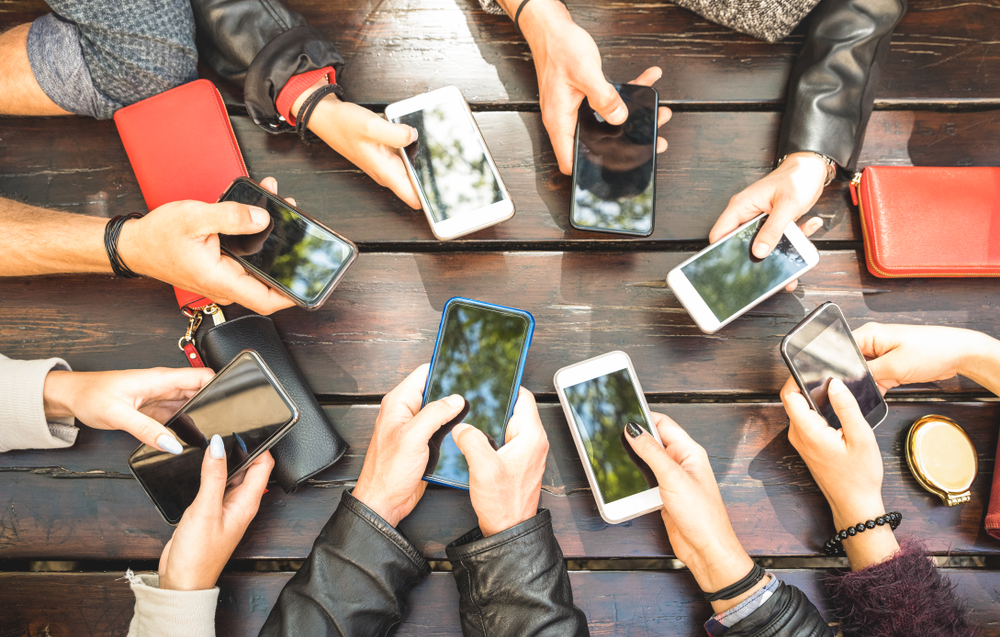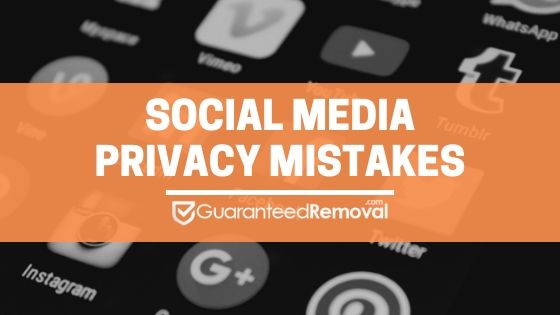Social Media Privacy Mistakes
Top 6 Social Media Privacy Mistakes
Approximately 70% of our nation’s adults can be found on some social media platform, however, most are not privy to the most up-to-date privacy settings and controls. Yet after a plethora of colossal information leaks, as well as Fakebook’s Cambridge Analytica incident, some people proceed to distribute important, personal and private data that others can use against them.
Here are six of the most prominent social media privacy mistakes that individuals make on a daily basis—their consequences—as well as some suggestions for managing your data securely online.
1. Distributing Personally Identifiable Information
Personally identifiable information (PII) includes all types of information that another individual can utilize to distinguish who you are—this can be accomplished on its own or consolidated with other data available on the internet.
Here are a few examples:
- Email accounts
- Driver’s license number
- Social Security number (SSN)
- Banking Information
- International I.D. (Passports)
- Online Login Credentials
- Hospital & Medical Records
According to a survey conducted by Experian, Americans average posting roughly 3-4 of delicate data online for the world to see. Many people think that their subpar credit or low income decrease their chance of becoming a victim of identity theft. Nevertheless, this is an excellent argument because—everyone is vulnerable to these crimes.
In particular, the identical study revealed that more than 50% of the participants had either underwent identity theft personally or had a close friend or family member who did.
Criminals can collect an overabundance of information if they know where to look. This can be a name or birthdate. This alone exposed even the best and most prestigious individuals to different types of identity fraud. This would include gaining additional credit, tax filing, theft of statewide benefits and all of your financial and banking accounts.
Furthermore, cyber criminals can keep records of what they discover on social media in order to launch social attacks upon you to gain even more knowledge. This is why posting too much about yourself online and on social media is so dangerous.
Since your PII is so important to offenders, they are searching online 24/7 for whatever they can find. On the other hand, you must think again before posting a photo of your car for example and forgetting to alter or blur the license plate.
2. Geolocation & Geotagging
Tagging your photos with a geolocation tag is a great idea if you want your pictures to get noticed by more social media users in that specific region. However, if not done carefully you can potential disclose more than what you bargained for.
For illustration, what you post a geotagged photo onto your social media accounts it allows a large group of strangers to pinpoint your exact location. This can be great when you are actually looking to meet new people, however, if you do this at home and a criminal sees, now you’re in trouble.
Likewise, by publishing geotagged images of your everyday habits and routines, you are allowing strangers, data-gathering firms, and anyone else the ability to track your every movement.
Additionally, criminals who see geotagged images when you are on vacation know that they have loads of time to take all your valuables without worrying about you returning any time soon.
80% of burglars glance at social media when choosing what house to rob.

3. Proper Use of Social Media Privacy Settings
As the amount of information privacy scandals proceed to rise, most Americans are not being proactive about ensuring their privacy is protecting them as much as they could be.
Roughly 44% of Americans are regularly taking advantage of the privacy settings within their social media accounts and mobile apps. Most of the time users click agree because reading the terms & conditions, leaving them vulnerable to various cyber-attacks.
At the very least, you need to protect your phone number, birth date, email accounts, and geolocation in your social media profiles. This helps to reduce the risks of becoming a sufferer of identity theft.
Additionally, we recommend that you adjust the privacy settings on each social platform in order to refine who can actually view your posts.
- Facebook’s Basic Privacy Settings & Tools: This page tells you how to modify your privacy frameworks for current and past publications online. You can also discover how to form lists to block specific individuals or audiences as a whole.
- Twitter’s Safety and Security: This page has all the data you’ll want to improve the secrecy of your social media profiles. For instance, you can discover how to stop someone from researching you through your phone number or email address. You can also explore how to check if your posts are visible to others.
- Instagram’s Privacy and Safety Center: This page guides you on how to switch your account to private and how to modify who can see your photos. There are many directions depending on whether you are working on Instagram through a browser or the Instagram app on a smart device.
Still, it is imperative to keep in mind that even if you have switched your social media accounts to “private,” you do not know who viewed or copied your personal information before you went private.
Your relatives and friends may eventually share your posts with someone you are not familiar with—this is usually done on social media or by word of mouth.
This means that your private data may still find itself in the wrong hands. No matter how cautious you are.
4. Do You Know Who Your Social Media Friends Are?
Receiving and accepting a friend request from another individual that you don’t know presents that person with access to your information and interests. All the personal information that might contain on your Facebook is now available to a complete stranger. If you are on Facebook, it also lets them send you a message. Cybercriminals can utilize Messenger to transfer phishing information.
Befriending people you never met also increases your vulnerability. When it comes to courtship scammers who try to coerce you into giving them money or delicate private knowledge about yourself.
An added issue of approving these friend requests is that it makes your profile more exposed to being cloned or copied.
Have you ever received a friend request from an individual that you are now friends with? These requests stem from criminal scanning to expand their networks by employing fake accounts “borrowed” from real users.

If you ever noticed a fictitious account please report it to Support right away:
- Facebook: Facebook’s reporting mechanism allows you to report a fraudulent profile or page.
- Twitter: Report any account professing to be you or someone else that you know.
- Instagram: If you suspect your account has been hacked or someone is impersonating you, fill out this form.
5. Granting Access For Games & Surveys
To guarantee that you are not inadvertently transmitting your personal information, you ought to think again prior to using any online quizzes (Buzzfeed) or engaging with games on your smart device(s).
Enjoyable quizzes such as “Let Us Guess Your Age” “What Game of Thrones Character Are You?” or “What Career Fits Your Personality” are frequently just ways of collecting your personal data and passing it off to data-mining firms.
This popular quiz, “What Disney Character Are You?” for instance, tricks you into giving up your name and date of birth. Identity thieves can connect this with other information in order to steal your identification.
One representative of an organization clandestinely hijacking your information through online quizzes is that of Ukranian cyber thieves working for Cambridge Analytica. The 2 individuals collected personal data on more than 60,000 American users through quizzes like “What Country Would You Rule?” and “What Is Your Spirit Animal?”
By partaking in the quizzes, users unknowingly give forth personal information such as their name, picture, as well as age. These sites also gave cybercriminals access to their friend’s list.
While not every online quiz gathers and sells your information. It’s always a great plan to understand each quiz’s terms of service before you engage and turn over any information. That way, you can fully understand what sort of data the company receives and how it uses it.
Also, you need to keep in mind what sorts of questions a quiz is asking. Even the most ordinary data can be dangerous if it is the answer to a well-known security question such as “What was the first of your first pet?”
6. Keeping Personal Data Private
Apart from bypassing the five mistakes noted above, there are several ways you can keep your personal information more secure on social media.
- Utilize two-factor authentication: Two-factor authentication—such as a one-time phrase transmitted to your phone, this adds an additional tier of protection for the login process. Minimizing the possibilities of another individual hacking into your account. In particular, a Symantec study reveals that two-factor authentication could’ve stopped 80% of all data infringements.
- Don’t forget to log out if you ever have to have to use a public computer. If you are using a public pc, you should never leave before ensuring that your successful log out and close any programs that may contain personal information. This includes your social media accounts. Forgetting to do so makes your account extremely open to be taken over by the next person that using that specific computer
- Make sure that you devise a strong, unique password for each of your social accounts: Gone are the days where you could simply make your password ‘1234’. Think of something that nobody can guess. Instead of making your password ‘password9559’ try ‘PaSsWoRD955(‘ or something that will be nearly impossible to guess. To better track, your passwords across all of your social media profiles create a spreadsheet that is password protected. This way you will only have to remember one password, you can even add an additional preventive measure and implement two-way verification as previously noted.
- Never use any part of your username within your password directly. It may seem like an easy way to remember it, however, you are making hackers jobs 100% easier. Even worse, if another person steals your social login credentials, they can also obtain access to all of your third-party accounts as well. Scary.
More Information on Social Media Privacy Mistakes
If you fall into one of the categories above and have unfortunately used one of the six social media privacy mistakes mentioned above and are still struggling to restore your reputation we can help.
Please complete the form below and we will reach out with assist as soon as we can. Thank you for taking the time to read our article.
Keep Your Personal Information Private
In 2018, almost everyone has access to the internet whether it is via a smartphone or on a computer at home. While uploading photos to Facebook or Instagram may be fun, you need to keep in mind that everyone in the world now has access to your photo(s). It is essential to maintain a high level of security while writing or posting online.
Let us break down the top reasons why we feel you need to keep your personal information private. Personal reputation is how you are perceived by the world as an individual. It is the first thing anyone thinks about you when they hear your name or see your photo online. We all know that one friend that posts on Instagram 10x a day and updates his/her Facebook status regularly. You begin to form opinions about individuals that you have never even met by the way they carry themselves online. While most of this is under your control, you need to be cautious of what others do with that information you are publishing.
Top Reasons Why Should Keep Your Personal Information Private
Identity Theft
In this digital era, we are utilizing more online applications to manage our everyday lives. Ensuring your social media accounts and banking information is secure is not difficult if you follow some easy to learn steps. Identity theft is when an individual unlawfully obtains personal/private information about someone in order to impersonate them (mostly for) financial gain.
You can avoid these cyber-attacks by using different passwords on every website. This the most simple and effective way to stop identity theft. Many individuals use one or two passwords for everything. This is great for yourself and so you can remember but what happens when a hacker finds that one password, they now have access to everything!
Therefore, creating passwords that are alpha-numeric with at least 12 characters is the way to go. If you use letters, numbers, and special characters there are over 1 Trillion variations the hacker will need to attempt. Making this task nearly impossible and in turn, safeguarding your information for good. Change your passwords every couple of months.
The next step you should take to keep your personal information private would be to opt-out from any and all background reporting databases. These sites report your exact address, links to your social media accounts, and even friends and family members.
Removing yourself from these 40+ sites will make the task of finding your personal information even more difficult for any hacker. Lastly, make sure you constantly monitor all of your accounts for possible discrepancies. By monitoring your accounts, you will know instantly if something is wrong as you can resolve the issue before it gets bigger.
Future Job Opportunities
Next, sites like Facebook, Instagram, and Twitter are morphing into your “second resume”. This is where potential employers can get a good sense of your personality, an easy way to gauge if you are the right fit for their company. Unless your profile is private, refrain from posting political or religion based posts as this may hinder any job opportunities that come your way in the future. Do not walk into your next interview blind, review your social accounts prior to applying for a position to have the best chance of getting the job.

Credit Scams
This may seem fairly straightforward for many millennials, however, for the older users of the internet, this is very important. When you are online, there are some easy indicators you can see to instantly reassure you that the site you are on is secure. Most importantly find out if a site is ‘secure’. This is simply done by looking at the website address. When you type in Google.com, there is an https:// placed before the web address. This is the SSL telling you this site is secure “https://. If there is no ‘s’ that site is not secure.
As we start to drift away from cash to plastic credit/debit cards this opens new doors for cyberhackers. When setting up your cards, again make the passwords unique and change them monthly. In addition, use a PIN nobody can guess. This means to refrain from using addresses or birthday! As annoying this can seem it will benefit you in the long run by making yourself almost invincible to cyber attacks. Next time you are visiting your bank ask them about setting up secondary privacy questions, this will automatically lock someone out after too many wrong attempts.
Closing Thoughts on Keeping Personal Information Private
Nowadays it is very tempting to use every feature that social media offers, like the location for instance. Keep in mind that you are literally telling people where you are at that exact moment. These actions leave you prone to not only identity theft but other attacks like a home invasion! Your personal address does not have to be on Facebook, even if there is a field for it. Start by reviewing the privacy policies on each website and take every measure you can to safeguard your personal information. Be smart when you are online, we live in a very transparent world, therefore keeping your information private is imperative. Call us if you see something online you disagree with, we can help.
If you are seeking more information on how to remove articles from the internet check out our recent blog!

